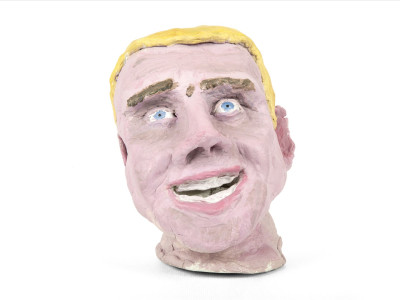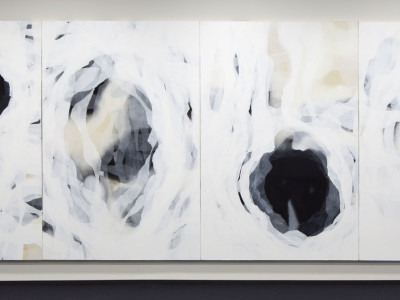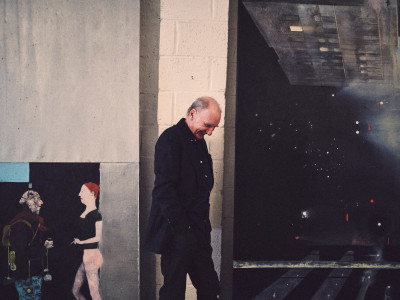
Eva Rothschild RA: "making things feels political"
Published on 3 May 2018
With news that the Irish artist has been selected to represent her country at the 2019 Venice Biennale, we meet Eva Rothschild in her London studio to talk being a sculptor, parent and feminist.
Eva Rothschild RA is an Irish sculptor now living and working in London. As well as numerous solo exhibitions, you may have seen her large-scale installation Cold Corners filling Tate Britain’s Duveen Gallery in 2009. In 2012, for The Whitechapel Gallery Children’s Commission, she made Boys and Sculpture, a film showing what happened when young boys were let loose in a gallery full of her artworks. She had a solo show, Iceberg Hits, at Modern Art, London, this spring and has another at the Australian Centre for Contemporary Arts in Melbourne later this year. In 2019 she'll represent Ireland at the Venice Biennale.

I grew up in suburban Dublin.
We lived near the sea. Within my family it was a liberal mainstream upbringing but the presence of the church was everywhere. I went to an all-girls convent school with an emphasis on girls' academic ability and career possibilities that was almost feminist, but coupled with a totally repressive view of sex, relationships and the body. It was a strange mix.
Sculptors aren't wandering artists.
That myth doesn't work for us. Sometimes I'll travel to draw or research or find inspiration, but I always return to the tools and materials in my studio when it's time to make the work. My practice needs so much stuff to function; it's very rooted in the studio.
I want a sense of place in my work.
The sculptures I'm making – using polystyrene, cardboard and spray paint – they're shaped by the context of London. I don't think they would have come about if I lived somewhere rural.
I like working at night.
I'd love to work late all the time. Once it’s dark you can pull down the shutters and feel like you’re in a little cocoon. I love that.

Doing repetitive tasks is important.
I like having days in the studio where I’m my own production line. The worst thing is to sit down and think, what am I going to make? But if you’re following steps to make things that needs to be made, you go into a different state. It gives your mind the space to think around making, to get to the next step.
You have to give something to an artwork to receive something from it.
Usually what you can give is looking time, but that’s a lot to ask for when we have so many distractions. And yet we still hope for a transcendent way of looking; we approach the material object with the desire that it’ll give us something more, some sort of unknown magical extra. It’s very similar to the way people of faith look at votive objects.
Our attention span has got shorter.
I’m not sure exactly when it happened but now everyone’s always rushing. There’s a way of looking that just wants to know: do I get this? Or do I not get it? Do I like it or not? Everyone’s guilty of it. You look and leave.
I want people to know what my work feels like.
I make stools and benches for people to sit on in my exhibitions, using the same materials as my sculpture. You can touch the stool and get a sense of what the sculpture feels like, without having your hands all over the artwork. It’s an opportunity to make contact with the materials, and an invitation to stay with the work a little longer.
My advice for younger sculptors would be make sure you have a reliable studio space. I think that means move out of London.
Eva Rothschild RA

We need to think about the things we’ll leave behind.
What will remain once we’re gone isn’t all the buildings we’ve built but all the plastic we’ve dumped in ocean. We’re only just waking up to that. We view a piece of wood as permanent and a piece of polystyrene as disposable but that’s not the case. It’s like we’ve lost touch with the materiality of the world around us.
Artworks are some of the only things we expect to remain fixed.
People buy houses, do them up, change them, knock them down, and they buy furniture, reupholster it, recycle it, throw it out. With most things there’s the sense of a life cycle but with the artwork, we think it’s eternal and fixed and must remain that way. I don’t want my artworks to always feel finished; they should have a sense of openness and possibility.
Sculpture is about taking up space.
It wasn’t until I went to art school and then when I began teaching at the Slade that I really became aware of how each gender does that differently. I’m interested in masculinity and that will-to-power, that sense that the world is yours for the making and taking.
I’m a feminist, obviously.
That’s been part of my way of looking at the world for as long as I can remember. It’s not something I had to go to university to learn; it’s always been part of my sensibility and worldview.
Having children expanded my view of everything.
I learn so much from living in the same house as my three sons. I'm fascinated by how they take everything in their stride. Their presence give me a totally different outlook on what's going on in the world – the news, the environment, even what music they're listening to.

There's still less visibility for female artists.
I don’t think there should be tokenistic equality but I do think as a curator, if you have to search a bit longer, a bit harder – well then look, find them, do it. You should be doing that work.
I’m an artist but I’m also a studio manager.
I want to concentrate on making but there are so many other parts of being an artist that have to be taken care of. Doing it all is really difficult and not something you’re taught. Although I wouldn’t have to do it if I wasn’t making a living from my art, so I guess it comes with the territory.
I think we need good leadership.
It’s like it’s gone out of fashion. Obviously leadership can be very dangerous as well but the current alternative – power by social media consensus – isn’t working. People just have their own views reinforced rather than challenged.
Making things feels somehow political.
So few people make things anymore but it's a way of creating specificity, of holding out against accumulation and proliferation. Making things feels like reclaiming space for a more intimate engagement with the material world.
As told to Alice Primrose.
Eva Rothschild will represent Ireland at the 2019 Venice Biennale.






